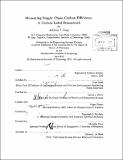Measuring supply chain carbon efficiency : a carbon label framework
Author(s)
Craig, Anthony (Anthony J.)
DownloadFull printable version (21.48Mb)
Other Contributors
Massachusetts Institute of Technology. Engineering Systems Division.
Advisor
Yossi Sheffi.
Terms of use
Metadata
Show full item recordAbstract
In the near term, efficiency improvements represent a key option for reducing the impacts of climate change. The growing awareness of climate change has increased the attention regarding the carbon emissions "embedded" in the products we consume. This increased attention creates a need to measure and improve the carbon efficiency of the supply chains that produce those goods. In this thesis we present a method for measuring the carbon efficiency of a supply chain that recognizes the decentralized nature of supply chains. First, drawing from concepts in supply chain performance measurement and eco-efficiency we propose a definition of supply chain carbon efficiency that is consistent with the idea of a product's carbon footprint. We present Life Cycle Assessment (LCA), a method for quantifying the environmental impact of a product or service, as the appropriate method of measuring a product's carbon footprint and demonstrate the use of LCA through a case study involving the supply chain of bananas. Next, we characterize the difficulty and uncertainty in performing an LCA of a supply chain through an analysis of our case study of bananas. We present a framework to reduce the uncertainty though the concept of a carbon label. The carbon label provides a system where firms can measure the carbon footprint of their activities and share this information with their supply chain partners. We identify the role of third parties in facilitating information sharing and define the characteristics that describe the carbon label. Finally, we demonstrate how the carbon label works in the context of the supply chain. Through an analysis of the mode and carrier assignment steps in an integrated supply chain we develop new metrics that show how sharing information can increase the accuracy of the measured carbon footprint and improve decision-making. We provide incentive for firms to share information through the development of a vertical differentiation model of product carbon labels. Our model shows how consumer demand for lower carbon products drives reductions in the carbon footprint throughout the supply chain and induces firms to voluntarily disclose their carbon footprint.
Description
Thesis (Ph. D.)--Massachusetts Institute of Technology, Engineering Systems Division, 2012. Cataloged from PDF version of thesis. Includes bibliographical references (p. 273-293).
Date issued
2012Department
Massachusetts Institute of Technology. Engineering Systems DivisionPublisher
Massachusetts Institute of Technology
Keywords
Engineering Systems Division.